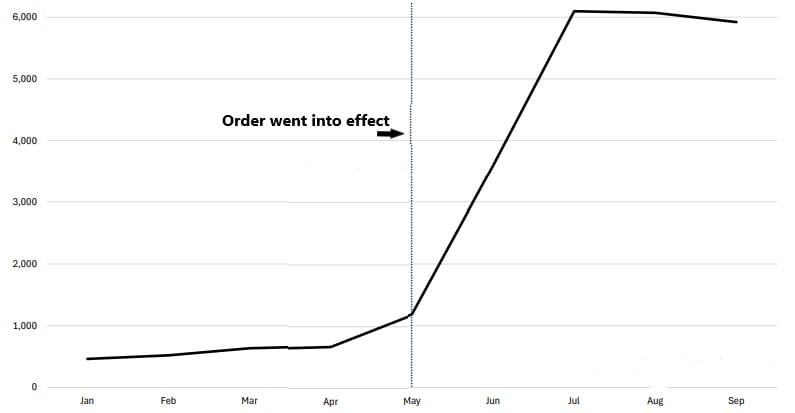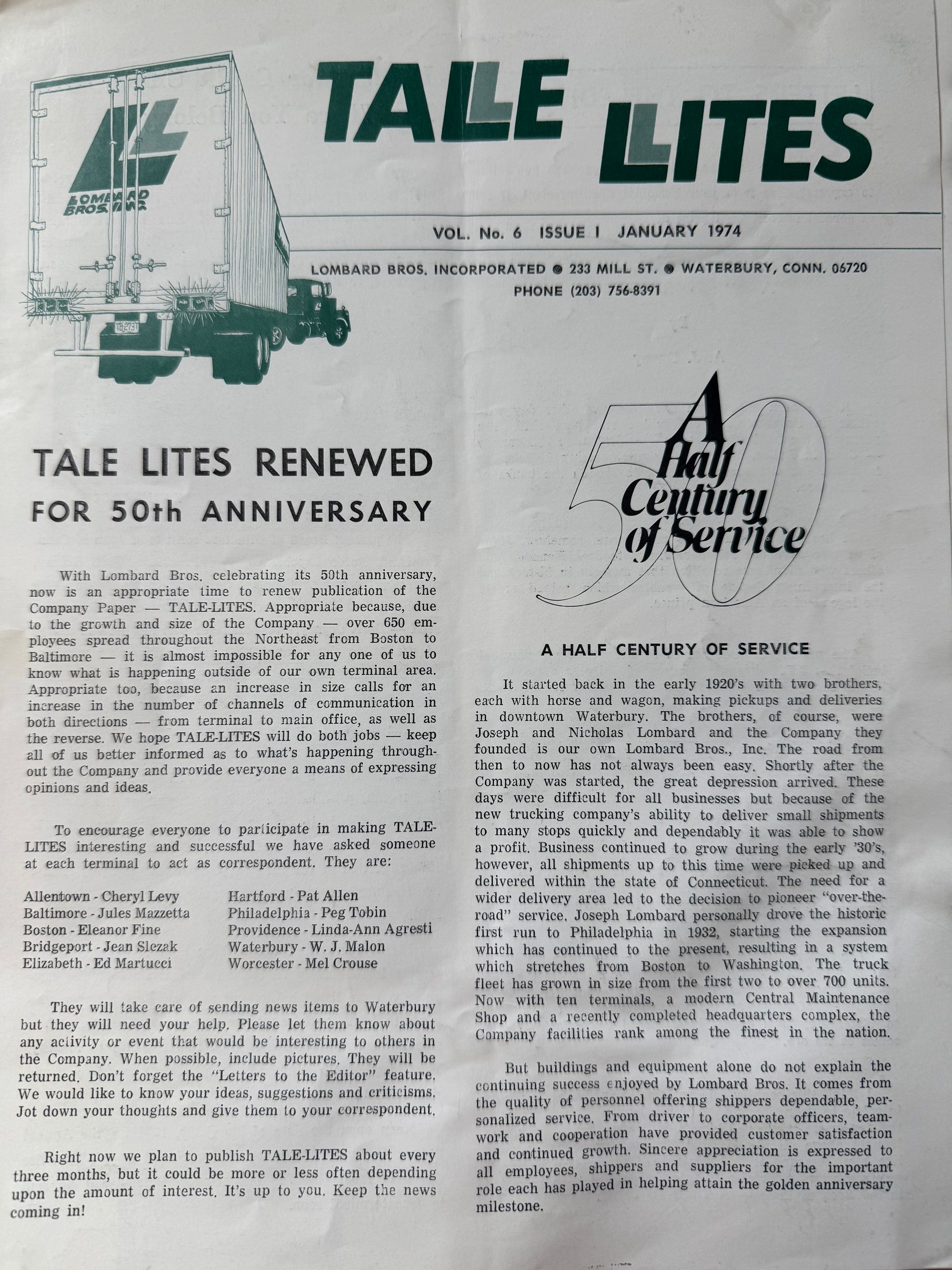- Truck Parking Club
- Posts
- Tale Lites Issue 39
Tale Lites Issue 39
New Study links ELP Violations to Bad Carriers - Guy Fieri Gets Double Brokered!

ATTENTION DRIVERS: If you are local or in the Boston, MA area on Oct 23-25th From 12:00-14:00 Please E-mail [email protected] for a Local News Interview about truck parking!
🚛 New Study Links ELP Violations to Shady Carriers
A new study from the University of Tennessee at Knoxville links truck drivers who violate English language proficiency (ELP) regulations to higher rates of safety violations and poor carrier safety scores. However the study cautions that lack of English Proficiency is a direct cause of these safety scores
The research, co-authored by Alex Scott, associate professor of supply chain management, looked at inspection and safety data from May through September 2025 to better understand how language barriers and safety performance intersect.

📊 The Numbers
2.5x more violations: Inspections that included an ELP violation had 2.5 times as many total non-ELP violations as a control group.
Nearly 3x higher rates of serious driver violations were also recorded in those same inspections.
Carriers with ELP violations consistently posted “bad” safety scores across FMCSA’s key categories — especially Vehicle Maintenance (9.06) and Unsafe Driving (6.23).
On the FMCSA’s BASIC scale, these are alert-level scores, signaling significant compliance problems.
The data also showed a spike in enforcement following an executive order in April 2025 emphasizing English proficiency compliance. But the reaction varied, California inspectors issued fewer ELP violations after the order, while federal inspectors increased enforcement. In fact, federal inspectors found ELP violations at rates 3.5x higher than Wyoming, the state with the next-highest rate.


🌎 U.S. vs. Non-U.S. Carriers
When comparing carrier bases:
U.S. based carriers had worse Hours of Service (HOS) compliance than their Canadian and Mexican counterparts.
Non-U.S. carriers, meanwhile, had very poor Vehicle Maintenance scores — averaging 12.25, one of the highest (and worst) on record.
Researchers suggested this gap may reflect differences in route length, with U.S. carriers driving the majority of longer OTR hauls versus shorter, daytime cross-border routes.
⚠️ Correlation ≠ Causation
The study stresses that language barriers don’t necessarily cause unsafe behavior. Instead, it highlights two possible explanations:
Regulatory misunderstanding: Drivers who can’t read or communicate effectively in English may struggle to interpret federal safety rules or maintenance requirements.
Exploitation risk: Unscrupulous carriers might hire non-English speaking drivers and pressure them to cut corners like from falsifying logs to neglecting vehicle upkeep.
English Language Proficiency has a been a law since the 1930’s, and where the data shows that the specific lack of English proficiency isn’t a direct causation, stricter enforcement would force the thousands of carriers operating outside of the law to either comply, or shut down. At the same time, states have allowed this low standard to continue because they are allowing these CDLs to be issued in the first place. A lot of this could change in the very near future when coupled with the information from last week’s newsletter!
Read more at FreightWaves
I want to hear from you! For Driver Submissions, questions, and comments contact me at: [email protected] or Text me directly at 423-275-2444
Trucker Member Survey! Take this Survey for a $25 promo code
Tale Lites Throwback
With it Being Italian-American Heritage Month here’s a look back at the Cover page of Tale Lites from January 1974 where you can read the shortened story of one of America’s first motor carriers!

🔥 Double Brokering Takes on Flavor Town 🔥
Two truckloads of Santo Tequila, a premium brand co-owned by celebrity chef Guy Fieri and rock legend Sammy Hagar disappeared somewhere between Texas and Pennsylvania late last year.
The commodity was worth over $1 million, and finally is giving some mainstream spotlight to one of the biggest issues effecting the industry: freight fraud and cargo theft
“If this can happen to us,” Fieri told 60 Minutes, “then everybody’s vulnerable.”
Myself, and so many others across X (Twitter) and LinkedIn have been lighting the torches of Gondor over double brokering for years. FreightWaves themselves even hosted an entire Freight Fraud Symposium! So, yes Mr. Fieri, everyone is vulnerable!
The shipment of 24,000 bottles crossed the US/Mexico border into Laredo, Texas, headed to a warehouse in Lansdale, Pennsylvania. In between Laredo and Lansdale is when it disappeared.
The Investigation:
Criminals posed as legitimate carriers and used forged documents, fake emails, and fake phone numbers to get the job.
The load was then double brokered to a fake carrier
Criminals even spoofed GPS signals to make it appear the trucks were near Washington, D.C., when in reality they were being rerouted to head west
By the time investigators caught it, one load had been sent to Los Angeles, where police recovered 11,000 bottles in a warehouse. The second load and trailer remain missing.
💻 The Rise of Digital Freight Crime (Strategic Cargo Theft)
If you’re a trucker, especially an Owner/Operator, you know that this wasn’t an isolated incident, it’s become a microcosm of the industry.
According to CargoNet, online freight diversion thefts have surged 1,200% in just four years.
“It happens multiple times a day,” said Keith Lewis, CargoNet’s operations chief. “And the cost of those losses 100% falls back on the consumer.”
The 60 Minutes investigation traced the Santo theft to a transnational gang operating out of Armenia, showing how global organized crime has adapted to exploit U.S. freight networks.
ATA estimates that cargo theft now costs the U.S. economy up to $35 billion annually, with the average loss exceeding $200,000 per incident.
Theft reports have surged 1,500% since early 2021, driven by:
Fake carriers and identity fraud
Cyber intrusion
Staged diversions
Weak enforcement and fragmented reporting systems
The DOT is now calling on industry leaders and stakeholders to help fight back. A recent Federal Register notice outlines strategies to deter cargo crime, including:
Stronger carrier identity verification
Better information sharing across platforms
Improved theft reporting and investigation coordination
🔒 My Take
It was only a matter of time until something like the Santo Tequila case would happen, and where I don’t like that it happened, it needed to happen so people can start paying attention to the industry. We’re talking about global criminal organizations who have infected our entire supply chain, and for the most part the FBI is almost nowhere to be found.
Guy Fieri said it himself, “If it can happen to us, it can happen to anyone.” - So if nothing gets done, then wealthy people can only expect to have this become an issue for them too
Freight fraud is a ramification of the Motor Carrier Act of 1980, because with rapid new entrants into the market, it deteriorated relationships. Couple that with the recent tech boom in freight, and lack of oversight this is the result. There’s an old saying “Fast, Cheap, and Good. You only get two.” And as the industry has chased Fast and Cheap since 1980, we get the Supply Chain we deserve.
📩 What Do You Think?
Should DOT programs keep running during shutdowns, or should politicians feel the fire like everyone else?
Reply to this email or text (423) 275-2444 — I want to hear what real drivers think about Washington’s woes!
Health Tip of the Week - Better Sleep without Prescription Medicine
Sleep is one of the hardest things to navigate while OTR . Between odd hours, parking next to a reefer, stress, your recovery is more important than ever. Without proper sleep it can lead to slower reaction times, weaker focus, and higher inflammation.
Here’s a science backed combo that doesn’t require any sort of prescription medication or melatonin that can change your sleep: 3 grams of glycine + 200 mg of magnesium glycinate about 30 minutes before bed.
🧬 Why it works:
Glycine is an amino acid that lowers your body temperature and calms the nervous system, signaling it’s time to rest.
Magnesium glycinate helps relax muscles and supports your parasympathetic (“rest and digest”) system, leading to deeper, more restorative sleep.
Together, studies show they improve sleep quality, HRV (heart rate variability), and overnight recovery, all without the grogginess melatonin supplements can cause
🚛 Driver pro tip:
Keep a small pill organizer in your cab and make it part of your nighttime routine. You’ll fall asleep faster, stay asleep longer, and wake up feeling sharper behind the wheel.
🛒 Where to find it:
You can grab both on Amazon, GNC, or Thorne (a top-rated supplement brand for purity). Look for:
Thorne Magnesium Bisglycinate Powder
NOW Glycine Capsules or Powder
Stay hydrated, wind down, and let your body recover overnight!
Partner Post of the Week
Check out our Partner Jeremy Rhames as he navigates getting some new batteries for his truck. Use the promo code rhames20 for $20 off your next booking!
Truck Parking Club Partner Program
Do you create content for truckers, want to help solve the truck parking crisis, and an opportunity to give drivers FREE parking? Let’s work together! Click below to apply for Truck Parking Club’s Partner Program today!